When Jack Alexander and his partner Laura went for their early 16-week baby scan, they were delighted to discover they were expecting identical twin girls.
But their happiness quickly turned to ‘devastation’ as they were told their babies were suffering from twin-to-twin transfusion syndrome (TTTS) – a rare condition which sees one fetus starved of blood and fluid.
The couple were soon faced with a heartbreaking dilemma: let one twin die to save the other – or undertake risky laser surgery for a chance at saving both.
Determined to fight for both girls, the couple were referred to St George’s Hospital in London for specialist treatment – a six-hour round trip from their home in Corfe Mullen, Dorset, which they could be required to make every week.
Jack, who has been forced to launch a GoFundMe, told the Daily Mail: ‘It’s devastating knowing that it could be 50/50. I’m just trying to be positive for my partner as she is very lost at the moment.
‘They said obviously if we don’t have it done, there is a risk that we could lose one.
‘But obviously it does carry risks to it as well.’
Jack, a chef, explained ‘Twin One’ is currently one week behind ‘Twin Two’ in their development, with midwives unable to see her bladder.
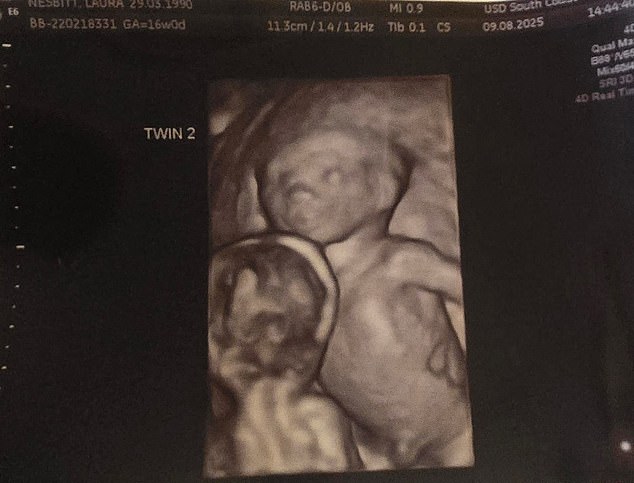
Twin Two (right) is receiving more blood and fluids than Twin One (left)
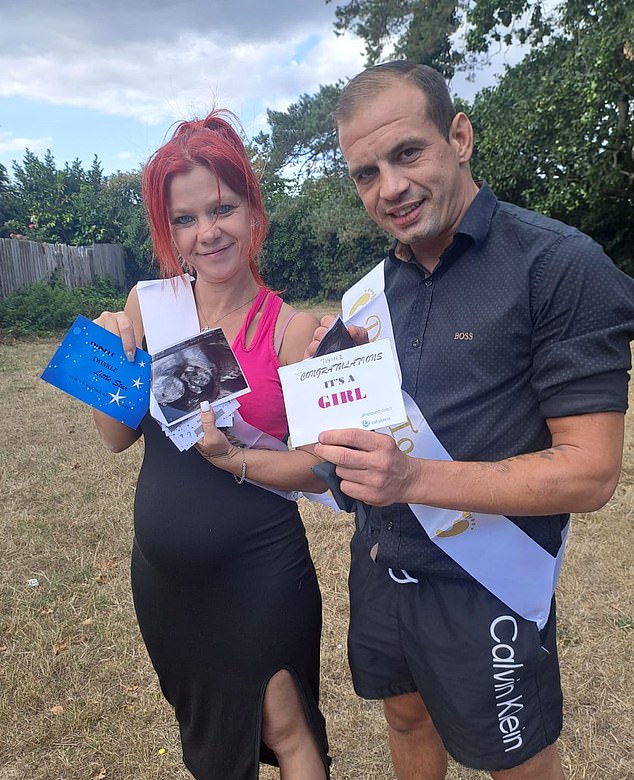
Jack Alexander and his partner Laura (pictured) were delighted when they found out they were having identical twin girls
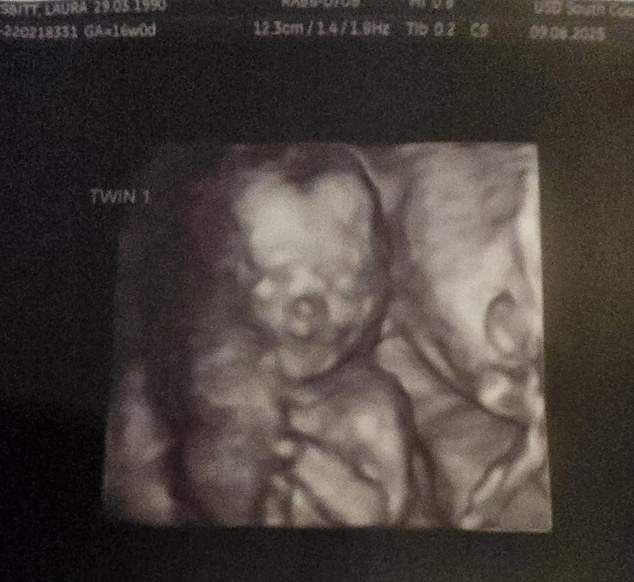
Twin One (left) is one week behind her sister in development due to twin-to-twin transfusion syndrome (TTTS)
‘It was a big shocker for us. We went for our 12-week scan and we didn’t know we were having twins, and [the midwife] said we’ve got identical twins in there,’ he said.
‘This made us emotional anyway, knowing this was a happy thing. We went for a private scan two days before our 16-week one, just for an early gender reveal, and she said Twin Two has got more fluid in their sack than Twin One.
‘She said this could be a problem.
‘We hung around, and two days later we went for our 16-week scan at Bournemouth hospital, and they said that they can’t see the bladder of Twin One.’
The couple, who have three children between them from previous relationships, said they are willing to take the risks that come with laser treatment for a fighting chance of saving both girls.
However, this means leaving behind their children – aged six, 10 and 13, for weekly visits to London that will be costly due to travel and hotel stays.
‘We have to travel up to London by car. Without traffic it’s just over three hours. I think we’ll have to do this every week near enough. They’ve classed her as high risk, so they’re doing weekly checks all the time as well,’ Jack said.
‘We have to travel all the way up, and if she does have this laser treatment, she’s going to have to stay up there for a few days, recover, and see how she is.’
He added: ‘You’ve got to be positive through this, otherwise you’re going to put yourself down. It is heartbreaking, but I need to be strong for my Mrs as well.’
The couple have launched a GoFundMe in a desperate bid to raise the funds they will need to travel to London.
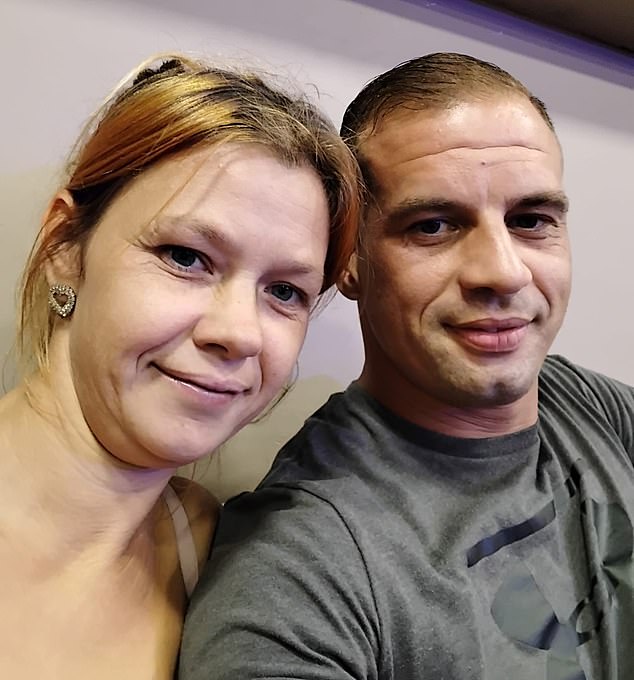
The couple have been faced with a heartbreaking dilemma: let one twin die to save the other – or undertake risky laser surgery for a chance at saving both
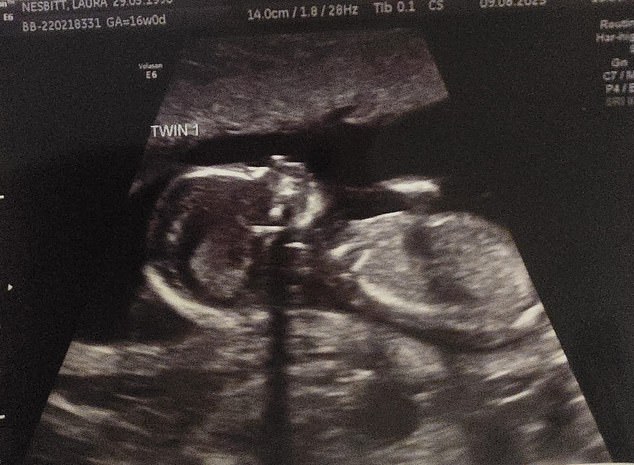
The twins will have more of a fighting chance of survival if her mother has laser treatment
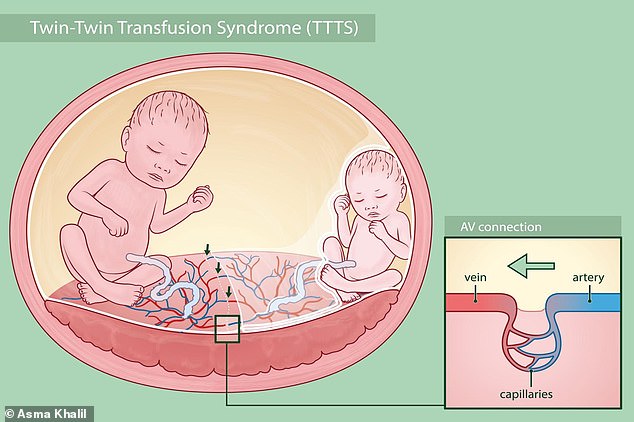
TTTS is a rare but life-threatening condition that affects 10 to 15 per cent of identical twins that share a placenta (monochorionic twins)
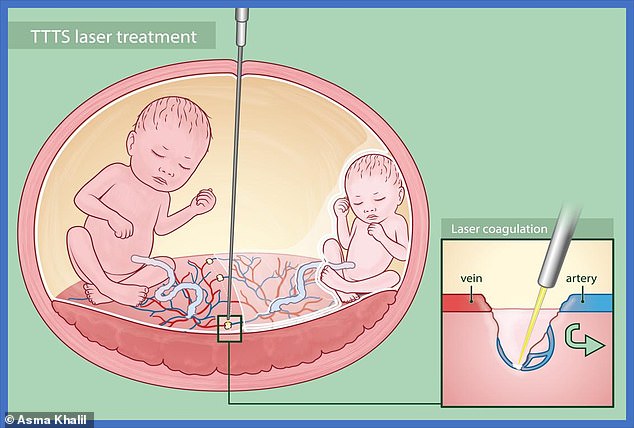
Asma Khalil, Professor of Obstetrics and Maternal Fetal Medicine at St George’s, said: ‘The laser surgery is not a risk-free procedure. It can trigger early birth or a miscarriage’
This year, former Little Mix star Jesy Nelson revealed she had been diagnosed with pre-twin-to-twin transfusion syndrome, meaning one or both babies could have died.
She had to undergo an emergency procedure in March after suffering complications, and was advised to remain in hospital until she was at least 32 weeks into her pregnancy.
In May, she confirmed both girls were safe and well – three days after giving birth prematurely.
Asma Khalil, Professor of Obstetrics and Maternal Fetal Medicine at St George’s Hospital, University of London, recommended that families facing a similar situation to Jesy and her partner contact the charity, Twins Trust, for resources and support.
She said: ‘TTTS is a rare but life-threatening condition that affects 10 to 15 per cent of identical twins that share a placenta (monochorionic twins).
‘If left untreated, you can lose one or both babies in up to 80% of the cases. Laser surgery is the recommended treatment. In 85 per cent of these pregnancies, at least one baby survives and in up to 70 per cent of cases both babies survive.
‘The laser surgery is usually performed under local anaesthesia and it usually lasts for less than 30 minutes. A fetoscope (thin camera) is inserted into the womb via a small incision. Abnormal vascular connections in the placenta are sealed using the laser.
‘The laser surgery is not a risk-free procedure. It can trigger early birth or a miscarriage. The pregnancy still needs close monitoring.
‘Parents could lose one or both babies. As this is a very stressful time for the family, the parents often need emotional support.’
If you would like to help Jack and his partner, visit their GoFundMe.












